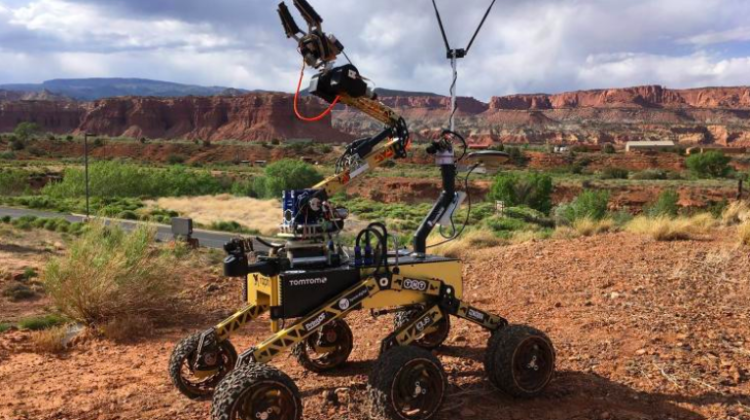New version of the Raptors` rover in the University Rover Challenge finals
 Source: Raptors PŁ
Source: Raptors PŁ
The latest version of the Mars rover built by Lodz University of Technology students from the Raptors team will compete in the prestigious space robotics competition for student teams - the University Rover Challenge in the United States.
"We hope that our improved rover will perform even better in difficult terrain thanks to better engine control. The also has improved mobility thanks to lower weight and better engines. It will also be more reliable" - says Kaja Łapińska from the Raptors team.
This year, the University Rover Challenge (URC) registered a record number of 95 student teams from around the world. The teams design and build a new generation of rovers that can simulate the potential tasks of robots on Mars. 36 teams from 10 countries qualified for the finals, which will take place in late May and early June in the desert in Utah.
The rover built by Lodz University of Technology students is an analogue of a real Mars rover. The robot weighs almost 50 kg, has a manipulator with 5 degrees of freedom, a sampler that collects material from the depth of 30 cm, a set of five cameras and specialized sensors. The robot communicates with via wi-fi antennas, which allows the operator to control it within a range of about 1 km. It can drive on a very difficult, stony terrain and can climb hills with a slope of up to 45 degrees.
The latest version of the rover will have a lot of new components and improved versions of previous solutions. The students focused mainly on improving the robot`s design and software. The main modifications are aimed at improving reliability, emphasises the Raptors group leader Mateusz Kujawiński.
The robot has a new gripper with an increased range, easier to fold and lighter so it does not burden the arm. Polyamide has been used for its construction. The rover will also have new, more efficient engines.
Among the most visible elements, the rover`s body has been changed, it is now made of carbon fibre. This makes it lighter, more durable, modern and innovative. "During the competition, penalty points are added for every extra kilogram, so every gram counts. The new body material saves about 2 kg. Another element that will reduce weight will be new wheels with aluminium and composite rims" - says Łapińska.
Young constructors also plan to install a new, pull-out mast with a rotating vision head. The new rover will also be higher, which will improve its range and communication. The robot will gain additional LoRa antennas, which will also increase its range.
"We are also developing new engine controllers and energy management system that allows for smart power planning. This will extend the rover`s operation time. We would also like to increase its computing power, so an additional on-board computer will appear in the latest version. This will improve route planning capability and trajectory calculation to the vision system" - explains the Raptors leader.
The robot also has a new location module, which - according to the students - will be much more accurate than the previous one. In addition, the robot will have an accelerometer and a gyroscope, allowing to analyse suspension shocks and angle. The mobile base station will also be new, which will shorten the time of robot deployment and enable efficient mission management.
"This year, we focus primarily on lightweight materials and design. The new suspension will also be waterproof, prepared for all weather conditions" - adds Kaja Łapińska. In her opinion, the rover built by students from Łódź stands out among other designs primarily due to its modularity. In addition, it is able to operate in places where other robots fail - in difficult terrain with steep slopes.
The first edition of the University Rover Challenge took place in 2006. Every year, the event attracts the most talented students from around the world. Participants present the capabilities of their rovers in several competitions.
This year`s competition will take place on May 31-June 2 at the Mars Desert Research Station in the Utah desert. In previous URC editions, the Raptors` rover took 5th place twice, and in 2016 it won the European Rover Challenge in Poland. (PAP)
szu/ zan/ kap/
tr. RL
Przed dodaniem komentarza prosimy o zapoznanie z Regulaminem forum serwisu Nauka w Polsce.














